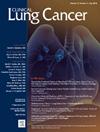转移性肺浸润性黏液腺癌患者的全身治疗效果
IF 3.3
3区 医学
Q2 ONCOLOGY
引用次数: 0
摘要
背景浸润性粘液腺癌(IMA)是肺浸润性腺癌的一种罕见组织学亚型,具有独特的临床、放射学、组织病理学和基因组学特征。有关肺 IMA 系统治疗有效性的研究有限,报告的结果相互矛盾。研究对象包括年龄≥ 18 岁、因转移性或局部晚期无法手术的疾病接受过至少一个疗程治疗的患者。研究筛选了113例IMA患者的档案记录。可靶向突变率为 20.6%(29 例患者中有 6 例)。大多数患者(83.1%)接受过铂类化疗作为一线治疗。接受化疗的患者客观反应率(ORR)为25.7%,中位无进展生存期(PFS)和总生存期(OS)分别为8.1个月(95% CI,5.02-11.2)和17.5个月(95% CI,11.7-23.3)。接受相关靶向治疗的表皮生长因子受体(EGFR)突变阳性患者(n = 3)的中位PFS和ORR分别为20.6(95% CI,18.9-66.5)和66.6%。只有一名患者在二线治疗中使用了奥沙利铂和卡培他滨联合疗法(XELOX)作为化疗,并在7.2个月时获得了部分反应(PR)。抗表皮生长因子受体(EGFR)靶向药物对表皮生长因子受体(EGFR)驱动突变阳性的患者可能有效。需要进行大规模的前瞻性研究来证实我们的发现。本文章由计算机程序翻译,如有差异,请以英文原文为准。
Efficacy of Systemic Treatments in Patients With Metastatic Lung Invasive Mucinous Adenocarcinoma
Background
Invasive mucinous adenocarcinoma (IMA) is a rare histological subtype of lung invasive adenocarcinoma with unique clinical, radiological, histopathological, and genomic characteristics. There have been limited studies on the effectiveness of systemic therapy for lung IMA, with conflicting results reported.
Methods
We retrospectively investigated the medical records of patients diagnosed with lung IMA. Patients who were ≥ 18 years of age and received at least 1 course of treatment for metastatic or locally advanced inoperable disease were included in the study. Archive records of 113 patients diagnosed with IMA were screened for the study.
Results
A total of 41 patients with lung IMA were included. The targetable mutation rate was 20.6% (in 6 of 29 patients). Most patients (83.1%) had received platinum-based chemotherapy as a first-line treatment. The objective response rate (ORR) was 25.7%, and median progression-free survival (PFS) and overall survival (OS) were 8.1 months (95% CI, 5.02-11.2) and 17.5 months (95% CI, 11.7-23.3 months), respectively, in the patients who received chemotherapy. The median PFS and ORR were 20.6 (95% CI, 18.9-66.5) and 66.6%, respectively, in epidermal growth factor receptor (EGFR) mutation-positive patients (n = 3) with relevant targeted therapy. Only 1 patient used oxaliplatin and capecitabine combination (XELOX) as chemotherapy in the second-line treatment and achieved a partial response (PR) at 7.2 months.
Conclusion
Platinum-based chemotherapies moderately enhance IMA patients’ survival rates. Anti-EGFR-targeted drugs are seen as potentially effective in patients with EGFR driver mutation positive. Large, prospective studies are needed to confirm our findings.
求助全文
通过发布文献求助,成功后即可免费获取论文全文。
去求助
来源期刊

Clinical lung cancer
医学-肿瘤学
CiteScore
7.00
自引率
2.80%
发文量
159
审稿时长
24 days
期刊介绍:
Clinical Lung Cancer is a peer-reviewed bimonthly journal that publishes original articles describing various aspects of clinical and translational research of lung cancer. Clinical Lung Cancer is devoted to articles on detection, diagnosis, prevention, and treatment of lung cancer. The main emphasis is on recent scientific developments in all areas related to lung cancer. Specific areas of interest include clinical research and mechanistic approaches; drug sensitivity and resistance; gene and antisense therapy; pathology, markers, and prognostic indicators; chemoprevention strategies; multimodality therapy; and integration of various approaches.
 求助内容:
求助内容: 应助结果提醒方式:
应助结果提醒方式:


